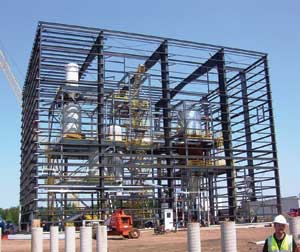CVEC receives grant for corn cob conversion study

May 9, 2008
BY Jerry W. Kram
The Minnesota Corn Research & Promotion Council and the Agriculture Utilization Research Institute will donate $50,000 to a project led by Chippewa Valley Ethanol Co. LLLP that will explore the use of corn cobs as a biomass energy feedstock at its 47 MMgy corn-fed ethanol plant in Benson, Minn.
"We plan to collect corn cobs from about 5,000 acres of our co-op members' corn crop during the 2008 harvest," said Gene Fynboh, biomass coordinator for CVEC. "With support and risk sharing from forward-thinking organizations such as [the MCRPC] and AURI, our members will be able to convert underutilized ag residues such as corn cobs into valuable energy sources more rapidly."
CVEC and the project team will demonstrate and evaluate two different cob collection systems during the study. The demonstrations will be open to the public. The study will also evaluate the field-to-facility economics of corn cob biomass utilization. The total project cost is estimated at $340,000. "Minnesota's corn organizations are pleased to have the opportunity to support a project like this," said Jerry Larson, chairman of the MCRPC. "Having an alternative energy source that is economical and lower in carbon emissions could make ethanol production more efficient and corn farming more profitable."
In early April, CVEC and its Ames, Iowa-based technology partner Frontline BioEnergy LLC fired up a new biomass gasification system adjacent to the ethanol plant. This system is capable of burning biomass materials to yield thermal energy that can displace the plant's natural gas energy inputs. "Corn cob biomass has superior material-handling properties and much lower ash content than corn stover, making it a better thermal energy source for ethanol plants," said CVEC General Manager Bill Lee.
While the ethanol plant plans to use wood biomass as its initial fuel source, the farmer-owned cooperative is eager to develop its members' agricultural residues into a secondary—and perhaps preferred—energy source. "The cobs collected from the same acres that supply corn to the ethanol plant can provide about 75 percent of the plant's gas energy needs," Lee said.
Other members of the project team include the University of Minnesota, Morris and the West Central Research and Outreach Center in Morris, Minn. WCROC staff will provide coordination, testing, and data collection and analysis for the project.
"We plan to collect corn cobs from about 5,000 acres of our co-op members' corn crop during the 2008 harvest," said Gene Fynboh, biomass coordinator for CVEC. "With support and risk sharing from forward-thinking organizations such as [the MCRPC] and AURI, our members will be able to convert underutilized ag residues such as corn cobs into valuable energy sources more rapidly."
CVEC and the project team will demonstrate and evaluate two different cob collection systems during the study. The demonstrations will be open to the public. The study will also evaluate the field-to-facility economics of corn cob biomass utilization. The total project cost is estimated at $340,000. "Minnesota's corn organizations are pleased to have the opportunity to support a project like this," said Jerry Larson, chairman of the MCRPC. "Having an alternative energy source that is economical and lower in carbon emissions could make ethanol production more efficient and corn farming more profitable."
In early April, CVEC and its Ames, Iowa-based technology partner Frontline BioEnergy LLC fired up a new biomass gasification system adjacent to the ethanol plant. This system is capable of burning biomass materials to yield thermal energy that can displace the plant's natural gas energy inputs. "Corn cob biomass has superior material-handling properties and much lower ash content than corn stover, making it a better thermal energy source for ethanol plants," said CVEC General Manager Bill Lee.
While the ethanol plant plans to use wood biomass as its initial fuel source, the farmer-owned cooperative is eager to develop its members' agricultural residues into a secondary—and perhaps preferred—energy source. "The cobs collected from the same acres that supply corn to the ethanol plant can provide about 75 percent of the plant's gas energy needs," Lee said.
Other members of the project team include the University of Minnesota, Morris and the West Central Research and Outreach Center in Morris, Minn. WCROC staff will provide coordination, testing, and data collection and analysis for the project.
Advertisement
Advertisement
Advertisement
Advertisement
Upcoming Events





